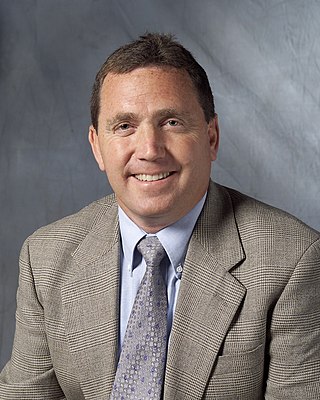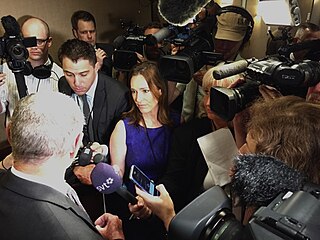Related Research Articles

Benjamin David Santer was a climate researcher at Lawrence Livermore National Laboratory and former researcher at the University of East Anglia's Climatic Research Unit. He retired from the Lawrence Livermore National Laboratory in 2021 and is now a Distinguished Scholar in Residence at Woods Hole Oceanographic Institution. He also worked at the Max Planck Institute for Meteorology from 1987 to 1992. He specializes mainly in statistical analysis of climate data sets, and detection/attribution of climate change forcings.

Siegfried Fred Singer was an Austrian-born American physicist and emeritus professor of environmental science at the University of Virginia, trained as an atmospheric physicist. He was known for rejecting the scientific consensus on several issues, including climate change, the connection between UV-B exposure and melanoma rates, stratospheric ozone loss being caused by chlorofluoro compounds, often used as refrigerants, and the health risks of passive smoking.

William Ernest McKibben is an American environmentalist, author, and journalist who has written extensively on the impact of global warming. He is the Schumann Distinguished Scholar at Middlebury College and leader of the climate campaign group 350.org. He has authored a dozen books about the environment, including his first, The End of Nature (1989), about climate change, and Falter: Has the Human Game Begun to Play Itself Out? (2019), about the state of the environmental challenges facing humanity and future prospects.
The Global Warming Petition Project, also known as the Oregon Petition, is a group which urges the United States government to reject the Kyoto Protocol of 1997 and similar policies. Their petition challenges the scientific consensus on climate change. Though the group claims more than thirty-thousand signatories across various scientific fields, the authenticity and methods of the petitioners as well as the signatories' credentials have been questioned, and the project has been characterized as a disinformation campaign engaged in climate change denial.

James Edward Hansen is an American adjunct professor directing the Program on Climate Science, Awareness and Solutions of the Earth Institute at Columbia University. He is best known for his research in climatology, his 1988 Congressional testimony on climate change that helped raise broad awareness of global warming, and his advocacy of action to avoid dangerous climate change. In recent years, he has become a climate activist to mitigate the effects of global warming, on a few occasions leading to his arrest.

The Atlantic Philanthropies (AP) was a private foundation created in 1982 by American businessman Chuck Feeney. The Atlantic Philanthropies focused its giving on health, social, and politically left-leaning public policy causes in Australia, Bermuda, Ireland, South Africa, the United States and Vietnam. It was among the largest foreign charitable donors in each of the countries in which it operated, and was the single largest funder of programs that encouraged the civic engagement of older people and of comprehensive immigration reform in the United States. With the single largest advocacy grant ever made by a foundation, the Atlantic Philanthropies committed $27 million to win passage of the Affordable Care Act in the United States. About half of the Atlantic Philanthropies' grants were made in donations that allow lobbying.

LGBTQ+ Victory Fund, commonly shortened to Victory Fund, is an American political action committee dedicated to increasing the number of out LGBTQ+ public officials in the United States. Victory Fund is the largest LGBTQ+ political action committee in the United States and one of the nation's largest non-connected PACs.
Daniel Horace Deudney is an American political scientist and Professor of Political Science at Johns Hopkins University. His published work is mainly in the fields of international relations and political theory, with an emphasis on geopolitics and republicanism.

The Census of Marine Life was a 10-year, US $650 million scientific initiative, involving a global network of researchers in more than 80 nations, engaged to assess and explain the diversity, distribution, and abundance of life in the oceans. The world's first comprehensive Census of Marine Life — past, present, and future — was released in 2010 in London. Initially supported by funding from the Alfred P. Sloan Foundation, the project was successful in generating many times that initial investment in additional support and substantially increased the baselines of knowledge in often underexplored ocean realms, as well as engaging over 2,700 different researchers for the first time in a global collaborative community united in a common goal, and has been described as "one of the largest scientific collaborations ever conducted".

Willard Anthony Watts is an American blogger who runs Watts Up With That?, a climate change denial blog that opposes the scientific consensus on climate change. A former television meteorologist and current radio meteorologist, he is also founder of the Surface Stations project, a volunteer initiative to document the condition of U.S. weather stations. The Heartland Institute helped fund some of Watts' projects, including publishing a report on the Surface Stations project, and invited him to be a paid speaker at its International Conference on Climate Change from 2008 to 2014.

Rick Antonius Kittles is an American biologist specializing in human genetics and a Senior Vice President for Research at the Morehouse School of Medicine. He is of African-American ancestry, and achieved renown in the 1990s for his pioneering work in tracing the ancestry of African Americans via DNA testing.

Victor Joseph Dzau is a Chinese-American doctor and academic. He serves as the President of the United States National Academy of Medicine of the United States National Academy of Sciences and Vice Chair of its National Research Council. He is Chancellor Emeritus and James B. Duke Professor of Medicine at Duke University and former president and chief executive officer of Duke University Medical Center.
Speaking of Research (SR) is an international group which "aims to provide accurate information about the importance of animal research in medical and veterinary science". It was founded in March 2008 by Tom Holder, an "energetic young British activist who played an active role in the Pro-Test movement at the University of Oxford," who moved to the US for the purpose of setting up such a group. Holder had previously been a spokesman for Pro-Test, as well as acting as emcee for their three demonstrations.

The World Union for Protection of Life is an international non-profit organization and non-governmental organization which was founded 1958 in Salzburg (Austria) by the writer Günther Schwab. The concept Protection of Life is considered to be different from the protection of the environment as it has been used by the United Nations Environmental Program (UNEP), though that organization was founded as a result of the United Nations Conference on the Human Environment in 1972.

The International Conference on Climate Change (ICCC) is a climate change denial conference series organized and sponsored by The Heartland Institute which aims to bring together those who "dispute that the science is settled on the causes, consequences, and policy implications of climate change." The first conference took place in 2008.

John Paul Holdren is an American scientist who served as the senior advisor to President Barack Obama on science and technology issues through his roles as assistant to the president for science and technology, director of the White House Office of Science and Technology Policy, and co-chair of the President's Council of Advisors on Science and Technology (PCAST).

The March for Science is an international series of rallies and marches held on Earth Day. The inaugural march was held on April 22, 2017, in Washington, D.C., and more than 600 other cities across the world. According to organizers, the march is a non-partisan movement to celebrate science and the role it plays in everyday lives. The goals of the marches and rallies were to emphasize that science upholds the common good and to call for evidence-based policy in the public's best interest. The March for Science organizers, estimated global attendance at 1.07 million, with 100,000 participants estimated for the main March in Washington, D.C., 70,000 in Boston, 60,000 in Chicago, 50,000 in Los Angeles, 50,000 in San Francisco, 20,000 in Seattle, 14,000 in Phoenix, and 11,000 in Berlin.

500 Women Scientists is a non-profit group dedicated to making science open, inclusive, and accessible. To achieve this mission, they work to increase scientific literacy through public engagement, advocate for science and equity, and provide self-identifying women with the tools and support they need to reach their full potential. The organization began with an open letter in November 2016 and was officially recognized as a 501(c)3 in May 2018.
The history of climate change policy and politics refers to the continuing history of political actions, policies, trends, controversies and activist efforts as they pertain to the issue of climate change. Climate change emerged as a political issue in the 1970s, when activist and formal efforts sought to address environmental crises on a global scale. International policy regarding climate change has focused on cooperation and the establishment of international guidelines to address global warming. The United Nations Framework Convention on Climate Change (UNFCCC) is a largely accepted international agreement that has continuously developed to meet new challenges. Domestic policy on climate change has focused on both establishing internal measures to reduce greenhouse gas emissions and incorporating international guidelines into domestic law.
Sustainable population refers to a proposed sustainable human population of Earth or a particular region of Earth, such as a nation or continent. Estimates vary widely, with estimates based on different figures ranging from 0.65 billion people to 9.8 billion, with 8 billion people being a typical estimate. Projections of population growth, evaluations of overconsumption and associated human pressures on the environment have led to some to advocate for what they consider a sustainable population. Proposed policy solutions vary, including sustainable development, female education, family planning and broad human population planning.
References
- ↑ Science, “Random Samples” section, October 31, Volume 322, Issue 5902
- ↑ "GPSO 2009 Pledges | Global Population Speak Out". Archived from the original on 2011-05-27. Retrieved 2011-04-26.